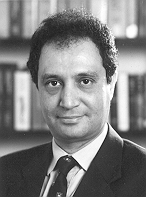| |
 |
 |
|
 |
 |
|
 |
 |
|
 |
| Avicenna Prize for Ethics in Science goes to Abdallah Daar |
 |
| UNESCO Director-General, Ko´chiro Matsuura, awarded the Avicenna Prize for Ethics in Science to Abdallah S. Daar, in the presence of Mohammad Mehdi Zahedi, the Iranian Minister of Science, Research and Technology on 14 April 2006 at UNESCO Headquarters in Paris. |
 |
 Abdallah S. Daar was chosen as the laureate of the 2005 Avicenna Prize for Ethics in Science by the Director-General of UNESCO upon the recommendation of a jury which met on 22 March 2005 in Bangkok, Thailand. This Prize is intended to reward the activities of groups and individuals in the field of ethics of science. Abdallah S. Daar was chosen as the laureate of the 2005 Avicenna Prize for Ethics in Science by the Director-General of UNESCO upon the recommendation of a jury which met on 22 March 2005 in Bangkok, Thailand. This Prize is intended to reward the activities of groups and individuals in the field of ethics of science.
Abdallah S. Daar, from the Sultanate of Oman, previously held the Chair of Surgery at Sultan Qaboos University in the Sultanate of Oman. He is currently Professor of Public Health Sciences and of Surgery at the University of Toronto (Canada), where he is also Director of the Program in Applied Ethics and Biotechnology and Co-Director of the Canadian Program on Genomics and Global Health at the University of Toronto Joint Centre for Bioethics, and Director of Ethics and Policy at the McLaughlin Centre for Molecular Medicine.
His significant contribution to research in the ethics of science and technology does not only cover a wide range of topics, but engages in depth with issues at the crossing point of science and ethics, technology and society. The impressive breadth of his numerous publications in the area of biomedical ethics is evident from the scope of themes that he covers, ranging from more traditional issues such as living donor transplantation to newer concerns such as the use of stem cells, genomics and xenotransplantation.
The Prize owes its name to the renowned 11th-century physician and philosopher of medieval Islam Abu Ali al-Husain Ibn Abdallah Ibn Sina (980-1038), known in Europe as Avicenna. This Prize, awarded once every two years, consists of a gold medal of Avicenna along with a certificate, the sum of $10,000, and a one-week academic visit to the Islamic Republic of Iran.
The jury of the Prize comprised Pilar Armanet Armanet (Chile), Chairperson of UNESCO's World Commission on the Ethics of Science and Technology (COMEST), Johan Hattingh, Rapporteur of COMEST, and Song Sang-yong, also a member of COMEST.
Related Links
|
|
|
| Author(s) |
UNESCO |
| Publication Date |
06-04-2006 |
| Source |
UNESCO |
|
|
|
|
|
|
|
 |
 |
 Email this page Email this page  Printable version Printable version
|
 |
|
|


